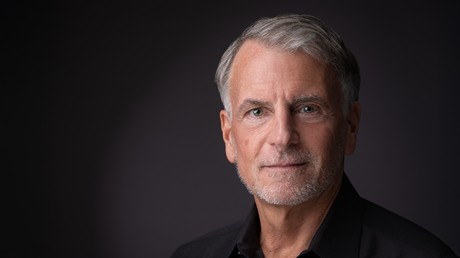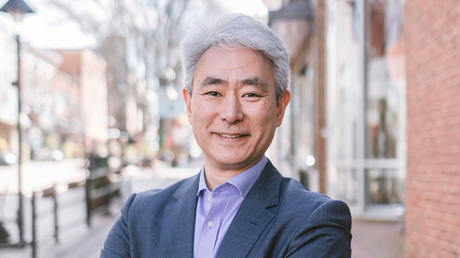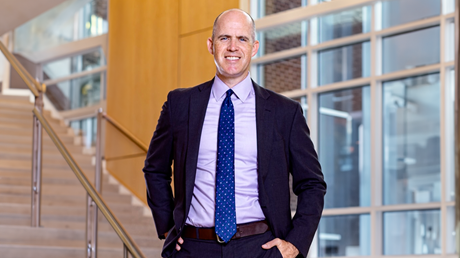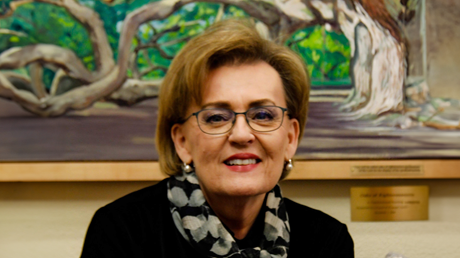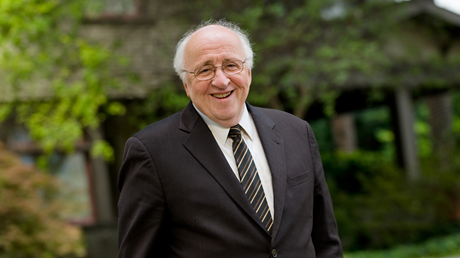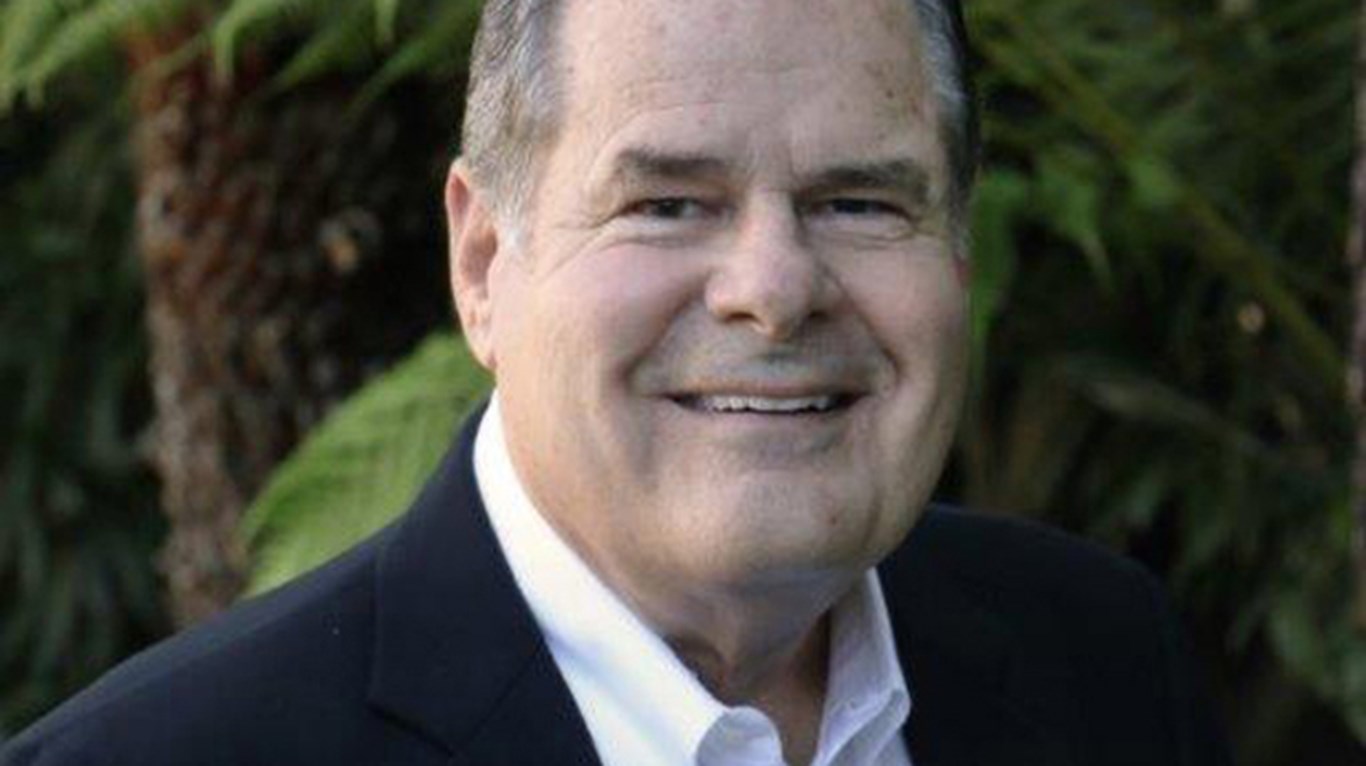
Give to the Beautiful Orthodoxy Fund to invest in our founder Billy Graham’s vision
Give NowGive to the Beautiful Orthodoxy Fund to invest in our founder Billy Graham’s vision
Give NowJohn Huffman first remembers hearing of Christianity Today as a teenager. His grandfather, an archeologist and Old Testament scholar, wrote for the magazine. His father was friends with Billy Graham. He accepted membership on the CT board in the late 1970s at the behest of Billy Graham and the then chairman Dr. Harold Ockenga. He recently spoke with CT about as a child first meeting a comparatively unknown Graham, why he's relieved he never entered politics, and the first time he thought the internet might prove to be a challenge for CT.
How old were you when you met Billy Graham?
Six. My father was one of the founders of Youth for Christ and brought Billy to Boston in 1946 for a Youth for Christ leadership convention. One afternoon when my mother and father were doing something else in their spare time, perhaps talking with Ruth Graham, Billy took me on a walk along the Boston north shore Atlantic Ocean beach. He was comparatively unknown then. He was just another bright young evangelist among many other of the Youth for Christ leaders. My dad, who had been Dr. Ockenga's first assistant pastor at the historic Park Street Congregational Church in Boston had tried to get an invitation for Billy to preach there. Dr. Ockenga's response was, "Not that young whipper snapper, he's not dry behind the ears yet" and yet four years later, Ockenga was the chairman of the New England Billy Graham crusade. In the meantime Billy had gone to LA in 1949, developed high recognition, and from then on was a national figure.
How did you decide to join CT's board?
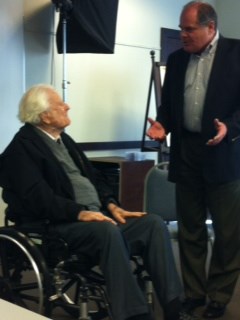
Billy Graham with CT chair John Huffman at November 2011 board meeting held at The Cove, The Billy Graham Training Center in Asheville, NC, the last board meeting Dr. Graham was able to attend.
I was very interested in journalism, politics, and the ministry. I had planned to go into politics as an undergraduate and went to graduate school at the Woodrow Wilson School of Public Policy at Princeton University in a joint program with Princeton Theological Seminary as I prayed to find clear vocational guidance. During that first year at Princeton, God made it very clear to me that He wanted me in full-time pastoral ministry, a ministry that would always be alert to the world of politics and journalism. I made it clear to the churches I served in Tulsa, Key Biscayne, Florida, and Pittsburgh that I needed to have a certain amount of time to serve the larger community beyond the local church membership. I over did this while at the First Presbyterian Church of Pittsburgh where I ended up serving on 13 boards including the United Way, a hospital board, a college board, along with other boards such as the National Association of Evangelicals and Gordon-Conwell Theological Seminary. When I decided to leave Pittsburgh and move to California I figured "that's crazy, I'm spreading myself too thin." So I resigned all but Gordon-Conwell knowing I was deeply committed to encouraging top level theological education for Christian leaders. I knew I wanted to do something in world issues so I accepted the invitation to join the World Vision board when it came along. And my lifelong interest in journalism made joining the CT board a natural. I felt the magazine was the most responsible of the various theological journals at that time. Now my ministry outside the local church and Presbyterian denomination was targeted into my primary interests of theological education, world concerns and journalism. I felt a real call to boardsmanship.
What type of legacy did Billy Graham leave at CT?
He constantly referred to his vision for a theological journal that would provide an intellectually sound and gracious articulation of historic evangelicalism that was prepared to go toe to toe with the more theologically liberal journals such as the Christian Century. That legacy has remained and with the internet has exponentially expanded its outreach even as it along with all print publications has faced severe economic challenges. Frankly, I think Christianity Today's influence is much bigger today than Billy ever dreamt it would be. It continues to present an irenic, gracious, and faithful commitment to the authority of scripture, ministry, and to impacting public life in what we now refer to as "Beautiful Orthodoxy."
Do you regret not getting into politics?
I would have to say very much no because of what politics has become is very different from what I perceived it to be as a young man. In those days evangelicals were almost unknown in the public square. My model for public service was the young Mark Hatfield, the governor and then senator from Oregon. He had a gracious, cerebral, persuasive style of leadership. It was that style I admired.
Today you have screaming and yelling at each other. It's very difficult to survive in politics. If you don't go with the party line, you don't have significance and impact. And if you do vote the party line, I would find myself having to compromise too much. I would say that my first 10 years in the ministry, I looked wistfully at the political area. But I also had a very clear call into the ministry and one of the people who was close to me said, "Look, since you're going into politics, make sure that every church you serve knows that they need to release you to minister to those who are in the public square of business and politics. If you are willing to subordinate your ego to the service of others you can multiply whatever individual impact you might have made quietly behind the scenes through the active public careers of men and women you will be able to influence for Jesus Christ and the public well-fare." Each church I've worked at has given 30 days a year to minister elsewhere. I've used this time to nurture these kinds of relationships of encouragement to those entering the public arena of politics, business and journalism. And since the mid-60s I've stayed active in "The Fellowship" that is part of the National Prayer Breakfast movement.
Tell me about the internet. When you first heard of it and when you started believing it would have dramatic implications for how CT did business?
Back in the early 90s, Harold Myra and Paul Robbins were alerting us to a revolution that was beginning to take place. At that time, there many new magazines being started every month. But as we moved into the late 90s, we realized that the younger generation was getting its material in a different form than those of us addicted to hard copy. We began to realize that the advertising dollars for print media were beginning to dry up as the internet presented new opportunities of websites for Christian college and book publishers in particular. We got the jump on many Christian publications because we came with up with what we called "print plus" being one of the first magazine publication companies to make many of our publication content available on the internet. We still are a leader in that. But we face the same challenges in trying to figure out the best way to monetize the internet so as to keep both our hard copy and internet communications economically strong in a world that has seen the demise of the once so strong publications as Newsweek, Reader's Digest and other publications once so strong.
What is the closest relationship you have made as a result of your time here?
During my 36 years on the board, I've been blessed to be close to the CT staff. I was very close to our first editor Carl Henry back at the beginning of CT because of a family relationship. I went to college with his son. He and my dad were best of friends during their graduate school days in Boston. And Harold Lindsell, Ken Kantzer, and all the rest of our editorial team through the Harold Myra and Harold Smith eras of CEO leadership have been great friends. The CT board itself has provided for me almost four decades of close friendships representing a cross section of Christian evangelical leadership. Meeting on a regular basis with these men and women who were and are the movers and shakers in American Christianity has been the real joy. Once you put aside making contributions in governance to keep the many publications going and carrying on the ministry of CT, I'd say it was the friendships and associations of staff and fellow board members that will be cherished for the rest of my life. Many of them are in heaven now and some of them are just coming on the board as new members.
What is one challenge you see for CT?
The first 20 years of Christianity Today were very difficult economically. Billy Graham would go around with a hat in hand and beg for money to keep the organization going. J. Howard Pew, who I worked for when I was in seminary, had a foundation and was Billy's biggest supporter but they still had to raise money elsewhere. The economic reality that we faced in those first two decades changed a bit when we moved from Washington D.C. to the Chicago area. Our new CEO Harold Myra was at first a bit controversial as he for personal reasons was not prepared to move to Washington. Senator Mark Hatfield, Billy Graham, Carl Henry and others considered that the publication should be in the nation's capital. However it soon became apparent that Myra and Robbins were making it possible for us to become a profitable non-profit organization. They helped start a number of new publications such as Leadership Journal, Books and Culture, and purchase other publications such as Today's Christian Woman and Church Law and Tax. We had two very strong decades financially. In the last 15 years there have been more financial challenges—not quite back to the first 20 years the way we were with Billy Graham—but about hitting our bottom line needed projections and staying in the black. Our outreach in terms of pages read in both hard print copy and internet have exponential increased but so have the financial challenges. Harold Smith and his team have done a tremendous job in maintaining and increasing the visionary and qualitative controls of this ministry in the most challenging of times in the publishing business both religious and secular.
The next challenge will be when Harold Smith decides to retire. I was on the committee that did the search for the leadership after Harold Myra and we interviewed some very competent people from outside the organization. But I am convinced now that if we didn't have the direction given to us by our long time CT team member now CEO Harold Smith, we would not have maintained the mission to the extent that Billy Graham established it and Harold has enabled us to keep. I would hate to see a day when Christianity Today becomes just another Christian periodical. If there now were no Christianity Today in its present form, someone at great cost would have to create it. My prayer, as I step down after 36 years on the board, is that this publishing ministry will remain strong fulfilling for future generations the essence of the Billy Graham vision held so strong these past 60 years!
Morgan Lee is assistant editor of Christianity Today.


